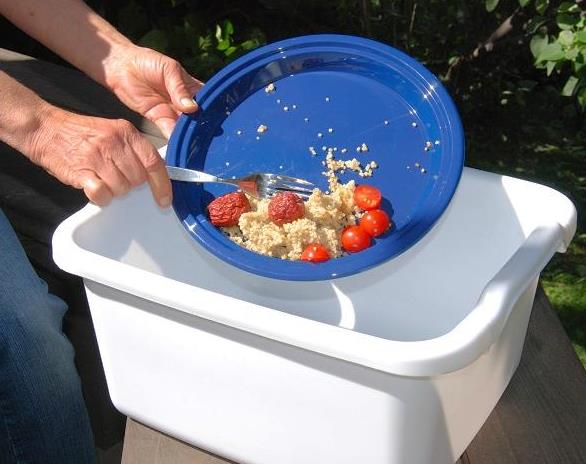Going for Zero Waste
Zero Waste events are fast becoming the norm in Davis, as one by one event organizers and ordinary people planning small parties weigh the pros and cons of purchasing disposables versus going sustainable. Whether small or large, organizations are looking for ways to make zero waste events easy and automatic. As Susan Steinbach stated after her Myanmar fundraiser for 200 guests, the planners knew about zero waste events in town and at the Unitarian Universalist Church, so going zero waste “just seemed like the right thing to do.”
CA 75% landfill reductions by 2020
Like all cities, Davis must reduce what goes to the landfill dramatically in the near future. Last year AB 341 went into effect, setting a goal for California to reduce, recycle, or compost 75 percent of its waste by the year 2020.
a goal for California to reduce, recycle, or compost 75 percent of its waste by the year 2020
“Each incremental step in waste diversion puts the state closer to our goal of 75 percent recycling,” said CalRecycle Director Caroll Mortensen. “The public is doing its part by being conscious of what we throw out and thinking about recycling and reuse.”
California presently sends 29.3 million tons of waste to California landfills. Officials say organic waste, like food scraps and lawn trimmings, make up most of the state’s waste, but disposables from events are a needless addition.
Stacie Frerichs was the hostess for the Myanmar fundraiser. She stated, “Lucas and I rolled out our 32 gallon trash can almost empty that evening after the event.” It turns out, Stacie has promoted zero waste at many events over the years.
Just how did the group feed 200 guests with no waste?
Planning for zero waste
It took a conscious decision at the planning stage to aim for zero waste. First, it meant finding a source for 200 reusable dinner plates, cups and wine glasses plus flatware. Fortunately, they knew where to turn. As a sponsor for the Myanmar fundraiser, the Green Sanctuary Committee of the Unitarian Universalist Church of Davis offered their collection of lightweight, dishwasher safe, reusable dishes and cups for 100, and the church loaned its flatware and tablecloths. Next, the planners appealed to Cool Davis for an additional 100 plates and cups, and members of the Democratic Club provided boxes of wine glasses they share for events. They chose compostable napkins available at the Davis Food Coop.

The importance of a sorting station with signs and tubs
To make the system work, tubs and signs are the magic ingredient. Stacie set up a sorting station for guests: a tub for uneaten bits of sausage to be frozen as dog treats for a dishwasher’s dog, a tub for all other food scraps to be composted, and tubs for dishes and flatware. For signs, Lynne photographed scraping a plate of leftovers with a compostable napkin into a tub for the custom compost sign, and found a dog with a sausage in his mouth for the bites of leftover meat. Laminated signs were taped to paint sticks and propped behind the tubs.
Another secret: Stacie had no landfill containers in sight! It was literally impossible to dispose of garbage, nor was any generated!
Cleaning up
At the end of the evening, the clean-up crew gathered the large bins of dishes and returned to the Unitarian Church. It took five dishwashers two hours to launder the table cloths while they washed and dried all the dishes, cups, glasses, and flatware using the 3-minute commercial dishwasher and put everything away!
our efforts spared the landfill and saved money
Richard McAdam said, “It was fun cleaning up together afterwards with friends, knowing our efforts spared the landfill and saved money for the children in Myanmar that would have otherwise gone to purchasing disposables.”
Stacie’s steps to achieving zero waste for a large event:
1. willing event hosts (the first time or two it takes some planning)
2. enough clean dishes of the correct kind/size (Whole Earth dishes are available; Cool Davis plans to make some kits available for various-sized events; make your own zero waste kit)*
3. sorting stations (tubs and signs are essential)
4. a place to wash and dry the dishes afterwards (commercial dishwashers are best, such as churches, Odd Fellows, Veterans Memorial, etc.)
5. volunteers to guide guests at the sorting station and to wash dishes afterwards
6. good storage bins for event dishware
A detailed guide for holding your own smaller zero waste event can be found here.
* Hint: For picnic-style, informal, or outdoor events, many folks like the dishes and cups called Preserve made from 100% recycled plastic which are attractive, dishwasher safe, light-weight, stackable, durable, inexpensive, and reusable. They are available at the Davis Food Coop and elsewhere in town.
Many organizations will want to pack their own event bin so they’re ready for zero waste events. They’ll save the expense and planning time before their event, and only need to schedule volunteers to help with the clean-up afterwards.
Tags
FACEBOOK FEED
Happy Earth Day Yolo County! Please stand with Cool Davis and Give Big today. It's a beautiful day but the house is truly on fire. Your donation helps us keep afloat and douse the flames. #EarthDay2024 #bdog2024 Davis City City of Winters, CA City of West Sacramento, Government City of Woodland Yolo County Climate Action and Sustainability Valley Clean Energy UC Davis Sustainability
www.bigdayofgiving.org/cooldavis
... See MoreSee Less
Photos from Cool Davis's post ... See MoreSee Less






